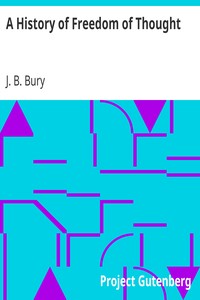今回の英文(前回のつづき)
(1)
IT is a common saying that thought is free. A man can never be hindered from thinking whatever he chooses so long as he conceals what he thinks. The working of his mind is limited only by the bounds of his experience and the power of his imagination. But this natural liberty of private thinking is of little value. It is unsatisfactory and even painful to the thinker himself, if he is not permitted to communicate his thoughts to others, and it is obviously of no value to his neighbours. Moreover it is extremely difficult to hide thoughts that have any power over the mind. If a man’s thinking leads him to call in question ideas and customs which regulate the behaviour of those about him, to reject beliefs which they hold, to see better ways of life than those they follow, it is almost impossible for him, if he is convinced of the truth of his own reasoning, not to betray by silence, chance words, or general attitude that he is different from them and does not share their opinions. Some have preferred, like Socrates, some would prefer to-day, to face death rather than conceal their thoughts. Thus freedom of thought, in any valuable sense, includes freedom of speech.
出典:John Bagnell Bury, A History of Freedom of Thought
前回のつづき。A History of Freedom of Thought の冒頭段落の第6文目から再開です。超長文になっているのでご注意ください。
※こちらは著作権切れの作品を扱うProject Gutenbergの蔵書ですが、もしも問題があった場合には記事を非公開または削除する場合があります。
各文の解釈(前回のつづき)
長いので一文ずつに分けてやっていきます。各文のポイントとなりそうな部分を取り上げていますが、必ずしも正しいとは限りませんので、悪しからずご了承ください。また(1)と出典が同じものは省略してあります。
(1-6)
Moreover it is extremely difficult to hide thoughts that have any power over the mind.
<Point 1>文全体の構造
itは不定詞以下を指す形式主語構文。
<Point 2>any power
anyといえば「任意の」が中核的な意味。特に「any+名詞」の場合には、基本的に次のうちのいずれかの意味ですね(どちらの意味とも解釈できる時もあり)。
①「種類的に任意の」 つまり 「どれでも」「だれでも」 (≒ any kind of~)
② 「数量的に任意の」 つまり 「少しでも」 「いくらでも」 (≒ any number[amount] of~)
以下、(1-6-1)は①の例、(1-6-2)は②の例、(1-6-3)は①と②のどちらでも解釈できる例です。
(1-6-1)
Any bed is better than none.
どんなベッドでもないよりはましだ
出典:『ジーニアス英和大辞典』
(1-6-2)
Is there any stew left?
シチューはまだ残っていますか
出典:『ウィズダム英和辞典 第3版』
(1-6-3)
Call me if you are in any difficulty.
何か[少しでも]困ることがあったら私に電話しなさい
出典:同上
これらの用例は辞書などでは別用法として区別されていることが多いようですが、"if"の意味合いが含まれているという点で本質的には同じでしょうね。(1-6-1)なら「どれであっても」、(1-6-2)と(1-6-3)なら「少しでも、一つでも」というように仮定つまりifのニュアンスがありますから。この意味では、anyの中核は「任意」と「仮定」の2つだと考えた方がいいかもしれません。
ここで本題ですが、(1-6)での any は(1-6-3)と同じように「種類的に任意の」 と「数量的に任意の」のどちらでも(あるいは両方の意味で)解釈することができると考えられます。すると、that have any power over the mindの部分の訳は「心に対して何らかの影響力をもつ」あるいは「心に対して多かれ少なかれ[多少なりとも]影響力をもつ」あたりが妥当ですが、個人的には、(1-7)の内容を加味すると後者の解釈の方が適切な気がします。
なお、anyは文脈によって「あらゆる」つまり every や all の意味と解釈できる場合もありますが、ここでは不適切だと思われます。
<Point 3>関係詞thatと先行詞thoughtsの解釈
単に和訳するだけならさほど難しくはないですが、ここではもう少し踏み込んで考察してみます。
一般に、制限用法の関係詞はそれ以外に存在することを暗示するといわれています。これは、たとえば John has a son who graduated from high school this year.といった場合、John には他にも息子あるいは娘がいることが暗示される、というものですね(もしJohnの子供は息子一人だけだということを明確にしたい場合には John has a son, who graduated from high school this year. とします)。
この考え方に従えば、(1-6)で言っている thoughts とは別の thoughts の存在が暗示されていることになりますが、果たしてそうでしょうか。次の(1-7)などを考慮すると、(1-6)での趣旨は「考えや思想というものは、どんなものであれ少なからず心に影響を与え、ちょっとした言葉や態度にその影響が現れる。だから隠しておくことは難しい」とみる方が自然に思えます。
つまり、ここでの thoughts は別の thoughts の存在を暗示しているわけではなく、単に「総称名詞」として用いられているだけではないでしょうか。もしこの推測が合っているとすれば、(1-6)は次のように言い換えできるはずです。
(1-6-4)
Moreover it is extremely difficult to hide thoughts, which have any power over the mind.
このように書くと、「考えを隠しておくことは極度に難しい。なぜなら考えというものには精神に対する何かしらの影響力があるからだ」といった意味がより明確になると思います。というのも、非制限用法の関係詞は理由や譲歩などを表すことできますから(以下の1-6-5を参照)。
(1-6-5)
We decided to hire Tom, who was a good speaker of English.
「トムを採用することにしたよ。彼は英語が達者だからね」
出典:佐藤ヒロシ『関係詞の底力』
<試訳>
「さらにいえば、心に多少なりとも影響力がある考えを隠しておくことは極めて難しい」
(1-7)
If a man’s thinking leads him to call in question ideas and customs which regulate the behaviour of those about him, to reject beliefs which they hold, to see better ways of life than those they follow, it is almost impossible for him, if he is convinced of the truth of his own reasoning, not to betray by silence, chance words, or general attitude that he is different from them and does not share their opinions.
<Point 1>文全体の構造
文構造が複雑で非常に長い文ですね。修飾語句をカッコでくくると次のようになります。
(If a man's thinking...they follow,) it is almost impposible for him (if he is...reasoning,) not to betray (by silence...attitude) that he is...their opinions.
主節の核となる部分は、it is almost possible for him not to betray that he is...opinions という形式主語構文ですね。ただしこの場合には、to betray...に not がくっついて「...をbetrayしないこと」という意味になり、さらにその前にfor him(=a man)という不定詞の意味上の主語が置かれているので、「a manが...をbetrayしないこと」という意味になっています。
<Point 2>a man's thinking
冠詞を見たらそれがかかる名詞を見つけるのが鉄則ですが、この場合 a がかかるのは thinking ではなく、man です。つまり、
[a man]'s thinking
という構造になっています。紛らわしいですが、そもそも冠詞と所有格名詞はふつう連続して配置できません。たとえば、a my ball とはいいませんよね。 a ball か my ball のどちらかです。もちろん a ball of mine とはいえますが、これはまた別の話。今回のケースでは、thinking は文脈上「考えること」あるいは「思考」といった行為を指すので不可算名詞扱いなはず、という点から考えてもいいかもしれません。
<Point 3>lead him to call....to reject...to see
lead someone to do で「人を~するように仕向ける」という意味。ここでは、to call と to reject と to see という3つの不定詞句が並列されている構造です。
<Point 4> call in question...himの語順
call something in callで「~に疑問を抱く」とか「~に異議を唱える」などの意味です。ここは本来の語順なら call ideas and customs in question となりますが、関係詞節が ideas and customs にくっついて目的語が長くなっているため、in question を call の直後に配置してあります。
<Point 5>those about him
(1-7)※再掲
If a man’s thinking leads him to call in question ideas and customs which regulate the behaviour of those about him, to reject beliefs which they hold, to see better ways of life than those they follow, it is almost impossible for him, if he is convinced of the truth of his own reasoning, not to betray by silence, chance words, or general attitude that he is different from them and does not share their opinions.
thoseとはpeopleの意で、those who...「...する人々」というよくある表現の仲間です。ジーニアス英和大辞典には次のような記載があります。
(1-7-1)
who節中の動詞がbe動詞の場合はwhoと動詞は省略されることがある.
出典:『ジーニアス英和大辞典』
これに従うと、元の形は those who are about him だということになります。第5文にあった his neighbours の言いかえと考えればいいでしょう。以上から、直訳は「彼(= a man)の周りの人々」。
<Point 6>see better ways of life than those they follow
まずseeは「~に気づく」「~を見出す」といった意味だと考えられます。つぎにthoseですが、Point5でのthoseとは別で、こちらのthoseは単なる「(複数の)モノ」という意味です。もとの形はthose which[that] they followで、関係代名詞の目的格であるwhich[that]が省略されています。
ここで少しまとめておくと、「those+関係詞節(または前置詞句)」は複数の人を指すときと複数のモノを指すときの両タイプがあるということですね。
<Point 7> it is almost impossible for him...not to betray...that he is~
やっとこの文の主節部分です。it は for him not to betray that he is~をさす形式主語構文になっていて「...」の部分には修飾語句が挿入されています。また、him と he と his は相変わらず a man のことですね。
<Point 8> the truth of his own reasoning
truthは「真実性」あるいは「本当であること」の意。ここでの of は主格と考えられるので、his own reasoning is true と言いかえることができます。また、reasoning は thoughts の言いかえでしょう。
<Point 9>not to betray...that he is~
(1-7)※再掲
If a man’s thinking leads him to call in question ideas and customs which regulate the behaviour of those about him, to reject beliefs which they hold, to see better ways of life than those they follow, it is almost impossible for him, if he is convinced of the truth of his own reasoning, not to betray by silence, chance words, or general attitude that he is different from them and does not share their opinions.
betrayは「[that節を従えて]~を(うっかり)さらけ出す」の意。「意図せずに」というニュアンスがあるのが特徴ですね。 not to betrayで「~をうっかりさらけ出さないこと」という意味になります。
また文末の方にある them と their はthose about him を指します。does not share their opinions の部分は直訳だと「彼らの意見を共有しない」ですが、これは文脈から考えて「意見が合わない」ということでしょうね。
not to betray と impossible とで二重否定になっているので内容が分かりにくいですが、主節部分の趣旨は「自分は周囲の人間とは考えが違っているということが、態度や言葉の端々から他人にほぼ必ず伝わってしまう」ということでしょう。これを踏まえて、主節部分を試しに言いかえをしてみると、
his silence, chance words, or general attitude will almost never fail to betray that he is different from them and does not share their opinions.
のようになるでしょうか。
<Point 10> by silence, chance words, or general attitude
このchanceは形容詞で「偶然の」というのが辞書的な意味です。ここでは「意図せず偶然出た言葉」といった意味でしょう。
問題は general attitude の処理です。個人的には最も分かりにくい箇所かもしれません。直訳だと「全般的な態度」とか「全体的な態度」ですが、これではよく分からないので順を追って考えてみます。
まず、attitudeのキホン的な意味をOALDで確認すると次のようになっています。
(1-7-2)
the way that you think and feel about sb/sth; the way that you behave towards sb/sth that shows how you think and feel
出典:OALD(9th ed.)
つまり、attitude の中核的意味は
①何かに対する考え方・感じ方
②何かに対する行動の仕方
のどちらかということですね。今考えている(1-7)では、自分の考えが周囲の人間と異なるということが無意識の行為からバレてしまうという趣旨なので、②「何かに対する行動の仕方」の意味と考えるのが自然です。より具体的には、「周りの人間に対する接し方」
でしょう。
ちなみに①「何かに対する考え方」の意味になるのは、以下の(1-7-3)のような場合です。
(1-7-3)
The discussion mirrored the general attitudes prevalent in the local area.
討論はその地域に一般的に広まっている考え方を写し出していた
出典:『ジーニアス英和大辞典』(ジーニアス用例プラス)
※ここでの general は common に近い意味と思われます
つぎに general について。ネット上にある和訳をみると、ここは「普段の」「日常の」などと訳されているようですが、これには少し疑問があります。というのも、直前にある "by silence, chance words"が明らかに対面で話しているときのことを言っているのに、最後の general attitude だけ「普段の生活態度」と解釈するのは文脈から少し離れてしまっているように見えるからです。
そこで類似表現を調べてみたところ、大きなヒントになりそうなものがありました。
(1-7-4)
彼の態度には全体に何かもの憂げな懐疑的なものがあった。
His general attitude was lazily skeptical.
出典:JTest4You (注:日本語学習者向けのwebsite)
(1-7-5)
His general attitude to our situation was unsympathetic.
出典:LDOCE Online
(1-7-4)での general attitude は「普段の態度」というよりも「とある場面での態度」と解釈する方が自然でしょう。では、general はどういう意味かといえば、「おおよその」という意味ではないでしょうか。つまり、ここでの his general attitude とは「ある場面において彼がほぼ一貫してとっていた態度」ということだと思われます。
もしこの解釈が正しいとすれば、(1-7-4)は「彼は終始、何かもの憂げで懐疑的な態度だった」と訳してもよさそうです。
同様に、(1-7-5)の general attitude も「普段の態度」というよりも「ある場面での一時的な態度」を指していると思われます。訳すとすれば「私たちが置かれている状況に対する彼の態度[反応]は、全体的に[概して]冷ややかだった」といった感じでしょうか。
なお、generalについては以下のリンクも参考になります。
さて、ここまでを踏まえて原文に戻ってみると、
(1-7)※再掲
If a man’s thinking leads him to call in question ideas and customs which regulate the behaviour of those about him, to reject beliefs which they hold, to see better ways of life than those they follow, it is almost impossible for him, if he is convinced of the truth of his own reasoning, not to betray by silence, chance words, or general attitude that he is different from them and does not share their opinions.
ここでいうgeneral attitude とはやはり「普段の(生活)態度」というよりも「会話などのやりとりをしているときに終始とっている(一時的な)態度」のことだと考える方が自然に思えます。訳すとなるとこのままでは長すぎるので、「接する(ときの)態度」あたりが妥当ではないでしょうか。
具体的には、よそよそしい態度とかいわゆる”塩対応”などが当てはまりそうですね。
<試訳>
「もし思考の結果として、周りの人間の行動を規定している考えや慣習に疑問を抱き、その信念を否定し、そしてそれらの人間が守っているものよりも優れた生活様式があることに気づくとすれば、自分は異質な存在であり周囲の人間とは意見も合わないという事実が、沈黙や何気ない言葉あるいは接する態度によってうっかり露呈してしまうことはないなどということは、 自分自身の思考を正しいと確信しているかぎり、ほとんど無理な話である」
(1-6)の補足
anyについての補足です。
(1-6-1)※再掲
Any bed is better than none.
どんなベッドでもないよりはましだ
出典:『ジーニアス英和大辞典』
(1-6-1)の用法はよく「any+可算名詞の単数形(または不可算名詞)」として説明されることが多いですが、可算名詞の複数形を置くことも割とふつうです。ただ両者の間には意味の違いあり、この点に関してウィズダムでは以下のように説明されています。
(1-6-6)
Any dictionary[dictionaries] will do.
どんな辞書でもいいです(≒If it is a dictionary, it will do.)(!(1)複数形と用いる場合は種類だけでなく数量も自由であることを暗示...(以下略)
出典:『ウィズダム英和辞典 第3版』
つまり「any+可算名詞の複数形」は、既出の(1-6-3)と同様にあいまいな表現だということになります。
(1-6-3)※再掲
Call me if you are in any difficulty.
何か[少しでも]困ることがあったら私に電話しなさい
出典:同上
このあいまいさについては、以下のリンクで紹介されている英文に対して3つの翻訳文が提示されているところからも確認できます。
(1-6-7)
Any impurities are removed before bottling.
(改訳例)ボトリングの前に、いずれの不純物も除去する。
(改訳例)ボトリングの前に、いかなる不純物も除去する。
(改訳例)ボトリングの前に不純物を除去する。
出典:株式会社ミドリインターナショナル
また、もし any が①「種類的に任意の」 (≒ any kind of~) の意味と、② 「数量的に任意の」 (≒ any number[amount] of~)の意味との両方を同時に表していることを明示したい場合には、次の(1-6-8)のように any number and any kind of~ という言い方があるようです。
(1-6-8)
This algorithm is flexible to work with any number and any kind of data related to driver alertness.
出典:Kassemi Langroodi, A. and Nahvi, A., "Design and Implementation of a Hybrid Fuzzy-Reinforcement Learning Algorithm for Driver Drowsiness Detection Using a Driving Simulator," SAE Int. J. Commer. Veh. 11(1):57-64, 2018
※ここでのwork with...は「...に働きかける」「...を扱う」の意と考えられます
※試訳:
「このアルゴリズムは、ドライバーアラートに関するあらゆる数・種類のデータを柔軟に扱うことができる」
なお、「any+可算名詞」については、以下のリンク先で回答者が説明している「Any questions will do. と Any question will do. との違い」も非常に参考になります。
https://ja.hinative.com/questions/16198720?utm_source_question_id=15159111
回答者の話を要約すると、次のような感じでしょうか。
a)聞き手が1人の場合、かつ、その人物からの質問が複数あると話し手が想定している場合
⇒Any questions will do.
b)聞き手が複数人の場合、かつ、別々の人物から複数の質問がくることを話し手が想定している場合
⇒Any questions will do.
c)聞き手が1人の場合、かつ、その人物からの質問が1つだけだと話し手が想定している場合
⇒Any question will do.
ふつうは a)または b)の場合でしょうから、Any questions will do. がよく使われることになります。一方、 c)は具体的にどういう場合に使うのかというと、たとえば以下のリンク先で English Otchan という回答者が示しているような「素早く質問に答える練習をしたいので、内容は何でもいいから一つ質問してくれますか?」 という場面が当てはまるでしょうね。
(1-6-9)
...could you ask me a question? Any question will do.
出典:DMM英会話 なんてuKnow?
補足は以上です。
次回につづきます。最後までお読みいただきありがとうございました。

